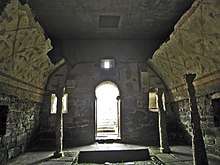Bóveda
See also: bóveda
Galician
.jpg)
A summery view. Bóveda, Lemos, Lugo

4th century Roman temple at Santalla de Bóveda, Lugo
Etymology
From bóveda (“arch, vault”), from Old Galician and Old Portuguese boveda (13th century, Cantigas de Santa Maria). Attested during the High Middle Ages as bovata.[1] From Germanic, probably from a Gothic *buwitha, from a derivative of Proto-Germanic *būaną (“to dwell, reside, build”).[2]
Pronunciation
- IPA(key): /ˈbɔβe̝ða̝/
Proper noun
Bóveda m
- A town and municipality of Lugo, Galicia, Spain.
- A parish of Lugo, Lugo, Galicia.
- Santalla de Bóveda de Mera. A parish of Lugo, Lugo, Galicia.
- A parish of Vilar de Barrio, Ourense, Galicia.
- Bóveda de Amoeiro. A parish of Amoeiro, Ourense, Galicia.
- A parish of Vilar de Barrio, Ourense, Galicia.
- A village in Churío, Irixoa, A Coruña, Galicia.
- A village in Miñotos, Ourol, Lugo, Galicia.
- A toponymical surname.
Related terms
See also

References
- “Bóveda” in Xavier Gómez Guinovart & Miguel Solla, Aquén. Vigo: Universidade de Vigo, 2007-2017.
- “Bóveda” in Ana Isabel Boullón Agrelo / Xulio Sousa Fernández (dirs.): Cartografía dos apelidos de Galicia. Santiago de Compostela: Instituto da Lingua Galega.
- “boveda” in Xavier Varela Barreiro & Xavier Gómez Guinovart: Corpus Xelmírez - Corpus lingüístico da Galicia medieval. SLI / Grupo TALG / ILG, 2006-2016.
- "Bovata" in Gallaeciae Monumenta Historica.
- Coromines, Joan; Pascual, José A. (1991–1997). Diccionario crítico etimológico castellano e hispánico. Madrid: Gredos, s.v. bóveda.
This article is issued from
Wiktionary.
The text is licensed under Creative
Commons - Attribution - Sharealike.
Additional terms may apply for the media files.